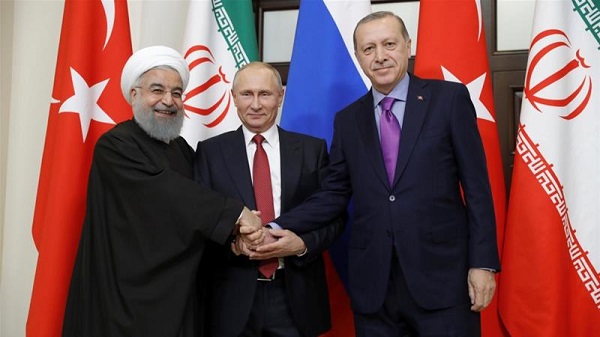Alwaght- Iran’s President Hassan Rouhani and Russia’s President Vladimir Putin traveled to Turkey to take part in the fifth summit of the initiators of the Astana peace process for Syria. Russia, Iran, and Turkey are expected to attempt to bring their views closer to each other to accelerate the political settlement, cooperate against terrorism, help Syrian refugees return home, and debate Syria reconstruction in addition to discussing the ceasefire and de-escalation of tensions.
Sochi meeting’s achievements
First Astana leaders’ meeting was held in 2017 in the Russian resort city of Sochi. Since then, the three presidents have three times talked about ways to settle the devastating Syrian crisis. The last round was held earlier this year in Sochi, with the participating sides vowing to preserve Syria’s national sovereignty and unity and help the political process with an emphasis on the United Nations Security Council’s resolution 2254.
Eight years after the start of the overwhelming crisis in Syria that also overshadowed the region’s security atmosphere, the Russian, Iranian, and Turkish partnership within Astana and Sochi processes to alleviate the crisis, prevent terrorism expansion, and reduce the plight of the Syrian people have been unmatched and largely constructive. The initiatives that stand a pattern to successful regional cooperation shine with their power to solve the crisis in the face of the trans-regional players’ initiatives that so far have only further destabilized the war-ravaged nation and sowed terrorism across the region.
Now vast tracts of lands are cleansed of foreign-backed terrorists and as conditions become safer, the ground is prepared for the refugees' return, aids delivery, and reconstruction beginning.
Certainly, preventing Syria split is one of the other precious achievements of the trio’s pro-peace partnership. In fact, despite the existence of open disagreements on the crisis and the future of Syria among the three countries, the Western plots to break Syria into smaller parts have effectively failed.
Points of discussion, challenges to the agreement
The three heads of state focused on how to make Idlib ceasefire sustain. The Syrian army since May launched a campaign to liberate Idlib and cleanse Hama as the last major strongholds of Turkish-backed rebels and terrorist groups. The Syrian operation, backed by Russia and Iran and opposed to by Turkey, came after Ankara failed to accomplish its promises to disarm the anti-Syrian militias made during Erdogan-Putin meeting of September 2018 and also thirteenth Astana meeting.
As Syrian forces recaptured the strategic town of Khan Sheikhoun in Idlib suburbs and encircled a Turkish forces’ post in Idlib, Ankara developed strong concerns about Idlib developments. According to an agreement made in 2017, Turkey had established 12 military posts in Syria’s northwest to de-escalate the clashes between the Syrian army and terrorists. Erdogan on Friday warned that any attacks on the posts will provoke reciprocal responses by Turkey and very likely will heighten the risks of Turkish-Syrian confrontation. Ankara also is worried about new waves of refugees to its borders.
“Turkey is now hosting 3.6 million Syrian refugees. It cannot accept millions of new refugees heading from Syria. We cannot stand such a heavy load,” Erdogan was quoted as saying. He also warned that he will “open gates” to Europe for refugees unless Turkey receives more international support to the refugee camps.
Although Moscow and Tehran take into consideration these Turkish concerns, they believe that preventing new deterioration of situation is largely tied to Turkey accepting the truth that firstly Syrian government has the legitimate right to extend its rule over the whole of the nation’s territories and secondly Turkey recognizes Syria’s territorial integrity.
Currently, Turkey holds vast parts of northern Syria in addition to helping the anti-Damascus militias in violation of the Sochi and Astana agreements. Syria several times protested Turkey’s occupation of its territories only to find Ankara leaders unwilling to remove their forces. In the current conditions, if Turkey wants Idlib truce to stand, it should stop arming the terrorist factions and take trust-making steps about the future of the occupied Syrian territories.
Another point of discussion was the establishment of the constitution committee, something Russia is in a haste to set up. For Russia, the Astana process is no alternative to a UN pro-peace mechanism but an element of a larger UN-supported process to solve the Syria crisis. That is why Moscow keeps open, though superficial, its contact lines with the UN, Washington and Tel Aviv.
While Russia sees Kurdish presence in the committee unavoidable, Ankara strongly opposes the idea as it seeks to restrict the Kurds’ role in the Syrian future. Meanwhile, Tehran gives a priority to the liberation of the whole Syrian territories to help the Syrian people themselves determine their future. Now the questions are can Ankara manage to block, or restrict, the Kurdish participation in the future Syrian talks? On the other hand, can Russia involve the Kurds in the political and reconstruction processes without triggering the Turkish anger?
When it comes to rebuilding, Tehran and Damascus have been way ahead as they signed several reconstruction pacts in early 2018 with the aim to bring back calm to the country despite the Western economic sanction and the slow pace of the trilateral process. A corridor from Iran to the Mediterranean will present a bridge to the significant sea through Syria and Iraq and will help Tehran and Damascus push ahead with their economic programs. Over the past years, Iranian exports to Syria doubled. Iranian companies are engaged in the Syrian power industry as well as new projects in oil and mining, making Iran a top Syria economic partner. In 2013, Iran launched its $3.5-million credit line to Syria allowing it to be granted the investment and business rights in Syria in return for oil imports to the embattled nation. The credit line was strengthened with more $1 billion in 2015. Now it remains to be seen if a new summit will lead to agreements that can sustainably manage the developments, especially in Idlib.



























